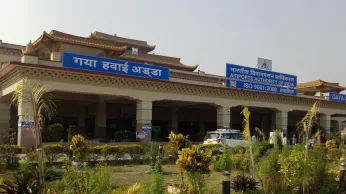
Aug 8
India’s Gaya Airport Keeps “GAY” Code Despite Political Pressure
READ TIME: 3 MIN.
Gaya International Airport, located in the historic and spiritual city of Gaya in Bihar, India, has been thrust into the national and international spotlight over its three-letter airport code: GAY. The code, assigned by the International Air Transport Association (IATA), drew criticism from some local politicians and community members, who deemed it culturally insensitive and offensive. However, India’s Ministry of Civil Aviation has confirmed that the code will remain unchanged, citing international aviation protocols and the absence of any safety concerns .
The debate intensified when Bhim Singh, a Member of Parliament from the Bharatiya Janata Party (BJP), raised the issue in the Rajya Sabha, the upper house of India’s Parliament. Singh argued that the code “GAY” offended the social and cultural sensibilities of local residents and travelers, and called for it to be replaced with a more “respectful and culturally appropriate” alternative . He also questioned the government about complaints and suggestions received regarding the code.
Responding to the parliamentary query, Union Minister of State for Civil Aviation Murlidhar Mohol clarified that the IATA assigns three-letter codes to airports based on international standards, typically using the first three letters of the city’s name. “Once the code is issued, it is not usually changed and any exception to it can only be made if the code offers any threat to air safety,” Mohol stated in a written reply . He also revealed that Air India had previously approached IATA seeking a change, but the request was denied under IATA Resolution 763, which asserts that assigned codes are considered permanent unless there are exceptional circumstances, typically related to aviation safety .
Gaya’s airport code has been in official use since September 2011, coinciding with the start of regular Air India flights between Gaya, Varanasi, and Delhi. The code’s assignment was based on standard IATA procedures and has functioned without issue for over a decade .
While some critics claim the code is embarrassing or offensive, LGBTQ+ rights advocates have pointed out that the discomfort reflects broader issues of homophobia and societal stigma. According to LGBTQ+ activists, efforts to change the code are less about aviation protocol and more about discomfort with the word “gay” itself . As one activist noted, “The call to change the airport code is a symptom of homophobia.”
Globally, other cities have faced similar controversies. For example, Sioux City in the United States attempted to change its “SUX” airport code after politicians expressed embarrassment, though ultimately the code remained. Fukuoka, Japan, also failed in an effort to switch its “FUK” code to “FUN” in 2019 for similar reasons . In each case, the permanence of IATA codes has been upheld, reinforcing the industry’s commitment to neutrality and standardization.
LGBTQ+ advocacy groups view the Indian government’s decision as an important signal. “Keeping the code ‘GAY’ is not only about following international norms, it’s about refusing to erase identities or give in to prejudice,” said an LGBTQ+ activist in India .
For many in the LGBTQ+ community, the controversy surrounding the Gaya airport code highlights ongoing challenges related to visibility and acceptance in India and around the world. The word “gay,” while a neutral descriptor for sexual orientation, still generates discomfort among some segments of society. Advocates argue that efforts to censor or change such terms, even in unrelated contexts like aviation, can perpetuate harmful stigmas.
The city of Gaya, known as a major pilgrimage site for both Hindus and Buddhists, holds significant spiritual and cultural importance. The debate over the airport’s code, however, has revealed the tension between tradition and modernity, and between cultural sensitivities and the need for inclusivity.
Despite the discomfort expressed by some residents, there is no evidence that the “GAY” code has caused harm or confusion in commercial airline operations. International aviation authorities emphasize that codes are assigned for practical reasons and are only changed when safety is at risk, not for reasons of social or cultural discomfort .






